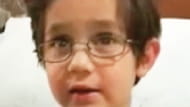Inborn Errors of Energy Metabolism
Glycogen storage diseases (GSDs) are a group of inherited disorders, each caused by a faulty gene. In children with GSDs, an enzyme that helps the body use glucose for energy is missing or defective.
Glucose is the body’s main source of energy. Enzymes help the body convert glucose into glycogen for storage and then back into glucose when needed.
When the body can’t convert glucose into glycogen as it should, glycogen levels build up in the liver and muscles.
Glycogen Storage Disease Symptoms
Children with GSDs may have symptoms such as:
- Low blood sugar.
- An enlarged liver.
- Muscle cramps.
- Poor growth.
Jerry Vockley, MD, PhD
Chief of Genetic and Genomic Medicine
Dr. Vockley is a world-renowned leader in treatment and research of inborn errors of metabolism like GSD. He’s also a founder of the North American Metabolic Academy.
Your Child's Glycogen Storage Disease Consult and Care: What to Expect
If doctors diagnosed your child with a GSD, we want you to know you’re not alone. The Center for Rare Disease Therapy (CRDT) at UPMC Children’s Hospital of Pittsburgh is here to help.
Here’s what you can expect when you come to us for a GSD consult.
What should I expect at my child’s first visit for GSD care?
You can expect your first visit to the CRDT to take from 4 to 6 hours. Your child will receive a complete assessment from one of the center's doctors.
The doctor will make or confirm a GSD diagnosis and find out how muchit’s progressed.
Since we work as a team at the CRDT, other doctors and staff might see your child during your visit.
These may include a:
- Brain, spine, and nervous system expert.
- Heart doctor.
- Surgeon.
- Nutritionist.
- Genetic counselor.
- Psychologist.
- Child development specialist.
What are the next steps after my child's GSD visit to the Center for Rare Disease Therapy?
Members of your child's care team will talk with you about:
- Likely next steps for your child.
- GSD treatment options.
- Ways to help your child's quality of life at home.
By the end of your visit, you'll have a GSD care plan tailored to your child's needs. We'll also schedule a follow-up visit.
You'll meet our nurse practitioner. You can contact them by phone or video conference with any concerns before your next visit.
Before you leave, please ask us about your child's GSD, treatment, or anything else on your mind.
How long will I need to wait for my child's GSD test results?
We'll call within 2 weeks to review the test results and the next steps for your child's GSD care.
You can also find your child's test results if you have a MyCHP account — Children's patient portal.
MyCHP lets you manage your child's health online. It's free for kids getting treatment at UPMC Children's Hospital of Pittsburgh and their loved ones.
Partners in Your Child's Glycogen Storage Disease Care
A child with a rare disease like a GSD affects the whole family.
You know your child better than anyone else. That’s why we see you and each family member as our partner in care.
The best treatment approach occurs when we combine our depth of GSD knowledge with your expertise in your child’s needs.
 Joshua's Story: Glycogen Storage Disease
Joshua's Story: Glycogen Storage Disease
The experts at UPMC Children’s recognized that Joshua had GSD when other doctors didn’t. A carefully controlled diet now keeps Joshua active and healthy.
Learn More »
Contact Us About Your Child’s GSD
At the CRDT, every child diagnosed with a rare disease receives a tailored treatment plan and family-centered care.
For an appointment, consult, or referral, contact us:
We’ll be in touch within 2 business days.









 Joshua's Story: Glycogen Storage Disease
Joshua's Story: Glycogen Storage Disease